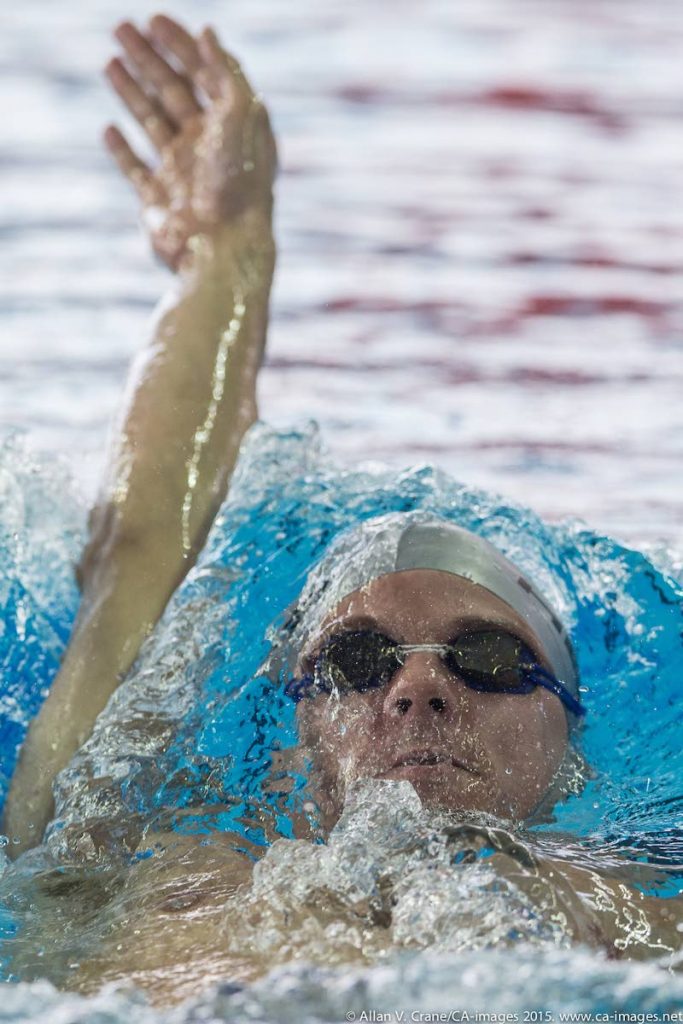Shoulder injury threatened to derail Bovell’s hopes

GEORGE BOVELL III was TT’s lone Olympic medallist at the 2004 Olympic Games in Athens, Greece.
Bovell III, then 21 years of age, copped bronze in the men’s 200-metre individual medley, becoming the first, and only, TT swimmer, to medal at the Games.
Recently, Bovell III and his coach Anil Roberts spoke about the journey they both shared – leading up to the 2004 Games, as well as the event itself.
Here is Part One of the journey…
The lead-up to the Games, how was it like?
Anil Roberts (AR): It was exceptional. George had a good 2003. He had one gold and two silver at the Pan American Games (in Santo Domingo, Dominican Republic). He made the World Championships (200m IM) final where he came fifth (in Barcelona, Spain).
In March 2004, at the NCAA Championships (in New York), I went up with him, he was representing Auburn University in his final year. He broke the world record (short course) in the 200m IM (with a time of one minute 53.93 seconds, on March 25, 2004), he had some great relay swims, so he was really in good form. After that, we started to prepare for the Olympics. Everything was going good.

George Bovell (GB): The build-up was less than ideal. I was swimming in America and, when you start to beat all the Americans, and you have an American coach, he stops caring about you.
I had to do it on my own really, so that’s why I got Anil involved. I look back at that, with some resentment towards the American coach (David Marsh) for the way he handled things.
I think it’s natural (about his resentful feelings). I was a big threat to the Americans and the Americans approach the Olympics very seriously. They like to be number one at all costs. So, I had to deal with that.
Bovell suffered a shoulder injury, in a vehicular mishap, before the Athens Games, an injury which threatened to end all hopes he had for a medal.
AR: He was on his way to practice, with his old jeep. He pulled the steering wheel with one arm and he strained his deltoid in his left shoulder. That sent us into a bit of a panic because we had to rest the shoulder, but we could not afford to lose any speed, power, aerobic threshold. I had to start to create a whole set of ideas to keep him training, with his legs and his right arm.
GB: In the build-up, I did have a shoulder injury. It was quite serious. I never really let on to anybody else, I didn’t even tell Anil or my dad, nobody. I couldn’t move my arm through the movements of the freestyle, butterfly or the backstroke. There was a lot of pressure but, of course, you don’t want to make excuses. You’re trying to be professional and go out there and take care of business.
In my mind, I was trying not to dwell on the fact that I was injured. I iced it twice a day. I spent my days very quiet, reading a book and preparing myself, cultivating a lot of strength and will-power, in order to do what I intended to do.
Bovell III, his father/manager George Bovell II and Roberts are both in Athens, with the ace TT swimmer involved in a couple of events, before the 200m IM.
AR: We went into the Games Village early because swimming is the first event (in) the Games. We went in on August 3 and his first race on August 12, which would have been the 100m freestyle. We knew we weren’t going into that event to get a medal but we wanted to get a solid swim, see where he was.
He went into the heats but, unfortunately, was disqualified for a false start. It was the first time that a disqualification (had) ever been overturned. When I looked at the card, I saw that the judge had just put false-start, they did not put what was the false-start.
I said, ‘you need to put more detail into the disqualification’. The panel upheld my protest and he was put back into the semi-final. He swam a good time (49.53 seconds), he didn’t make the final but it had given him a taste of the afternoon swimming. It had settled his nerves. It was very important for his mental health.
GB: I approached the Olympics like a busy schedule. The heats of the 200m freestyle came first, and I was the Pan American champion. I was very disappointed because of my injury, and my inability to practice freestyle, up until the race. Even though I gave like 150 percent, it was difficult, and my resulting time (one minute 49.59 seconds) was slower than the time that I gave at the Pan Am Games.
I really think if you really think positive, you can have effects of a positive mind affecting the body in positive ways. Then we’re getting ready for the 100m freestyle. I made the semi-finals. I can’t describe how much intensity and effort. I barely did my best time and even that was a great disappointment for me.

Comments
"Shoulder injury threatened to derail Bovell’s hopes"